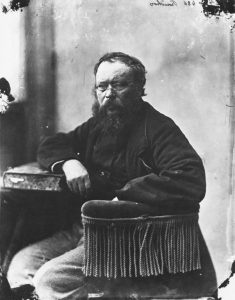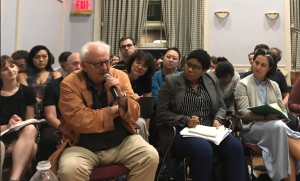Theo Bleckmann opens the seminar with music from Bertolt Brecht’s The Threepenny Opera.
Professors Amy Allen, Étienne Balibar, Karuna Mantena, Dan-el Padilla Peralta, and Bernard E. Harcourt
read and discuss
Manifesto of the Communist Party by Karl Marx and Frederick Engels
Critique of the Gotha Programme by Karl Marx
What is Property? by Pierre Joseph Proudhon
Thursday, December 3, 2020
 Pierre-Joseph Proudhon circa 1862
Pierre-Joseph Proudhon circa 1862
~~~
Pierre-Joseph Proudhon and, famously, Karl Marx militated for the abolition of private property at a time when, across the Atlantic, abolitionists were challenging slavery. As Marx and Engels declared in 1848 in The Communist Manifesto, at a time precisely when abolitionism was raging in the U.S.: “the theory of the Communists may be summed up in the single sentence: Abolition of private property.”
The relationship, interconnections, overlap, differences, and conflicts between the movements to abolish slavery and to abolish property are complex, to say the least. The historical record is fraught. But the resonances are clear.
Chattel slavery was, of course, a form of property, and its abolition entailed technically the abolition of property. As W.E.B. Du Bois emphasized, “Property in the South had its value cut in half during the Civil War.” But naturally, one half is not a whole. The abolition of slavery did not entail the abolition of property writ large. To the contrary, it was precisely the maintenance of property and the profit-motive that was responsible for the reproduction of forms of slavery through convict leasing.
From the other end, the abolition of capitalist property-ownership was often presented as a liberation from relations of dominance no different than slavery. As Marx and Engels wrote in The Communist Manifesto: workers in capitalist systems are “slaves of the bourgeois class, and of the bourgeois state” and “are daily and hourly enslaved by the machine, by the over-looker, and, above all, by the individual bourgeois manufacturer himself.” Or, even more explicitly, as Marx wrote in his Critique of the Gotha Program: “the system of wage labour is a system of slavery.”
The resonances are clear, but the history is fraught—especially the relationship between anti-racism and the labor movement.
And so we turn now, in this seminar, to the puzzle: How should we rethink the movements to abolish property through the lens of abolition democracy? How do we rethink Proudhon, Marx, and utopian socialist thinkers—as well as the entire political traditions of the labor theories of property and of value from Locke onwards—through the prism of abolition democracy?
[To read the full text of this introduction: click here. © Bernard E. Harcourt.]

Critique 1/13 at Columbia University, September 11, 2019
